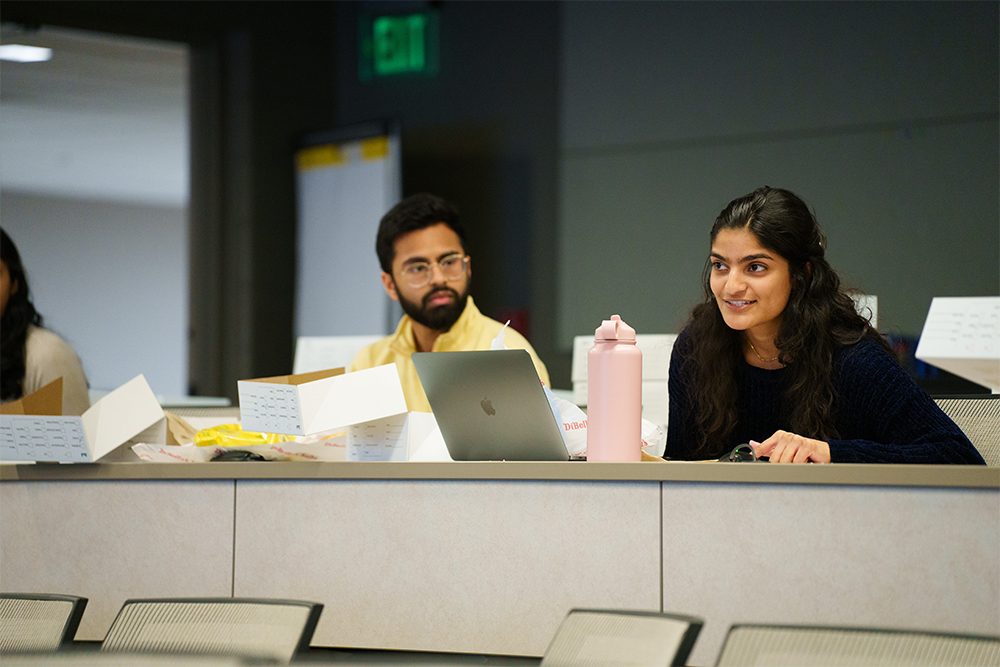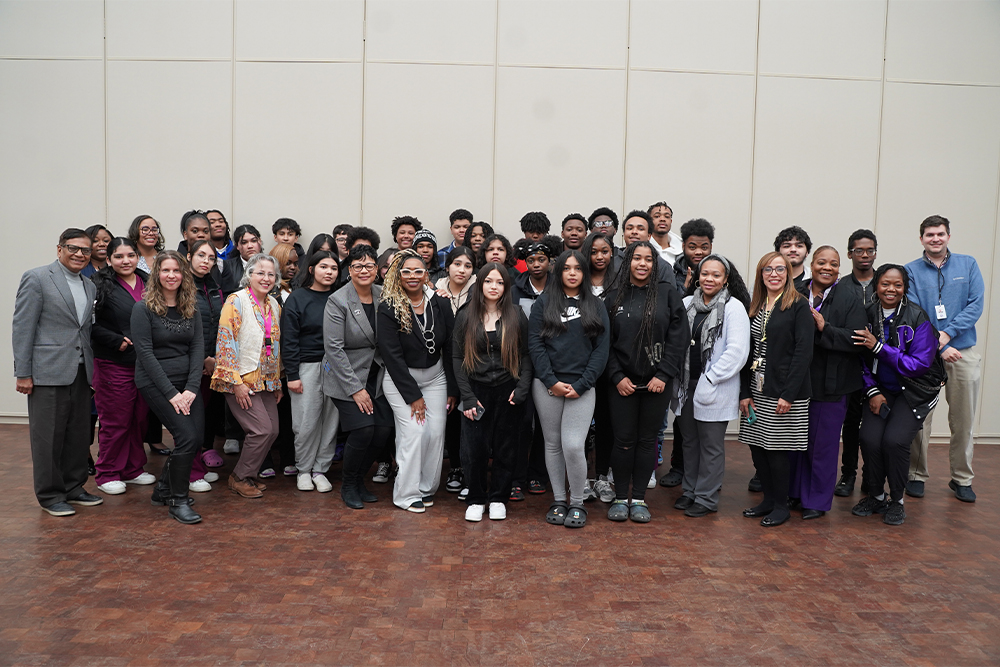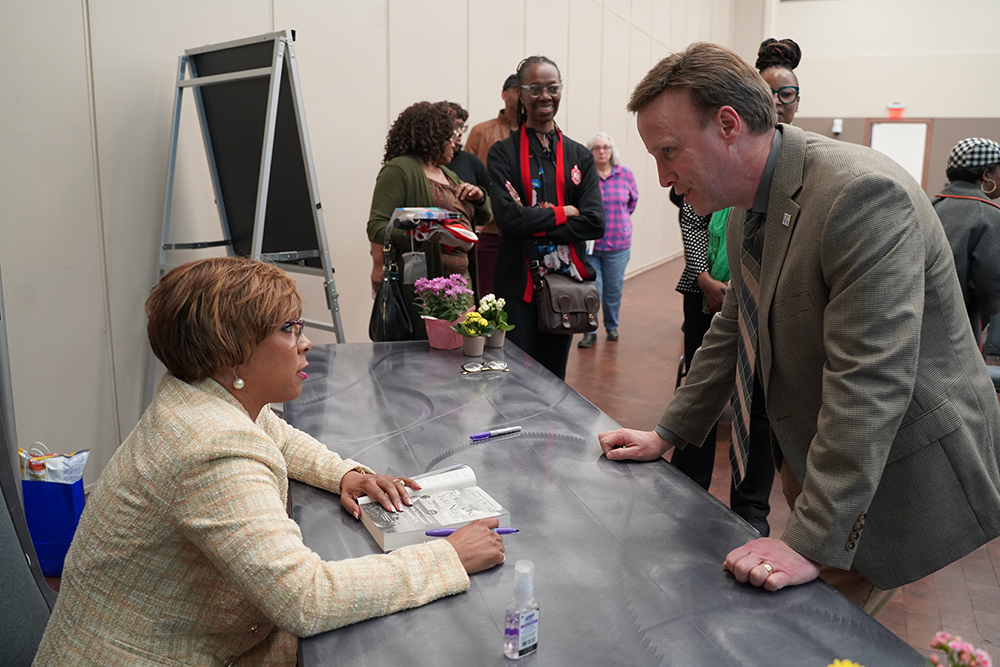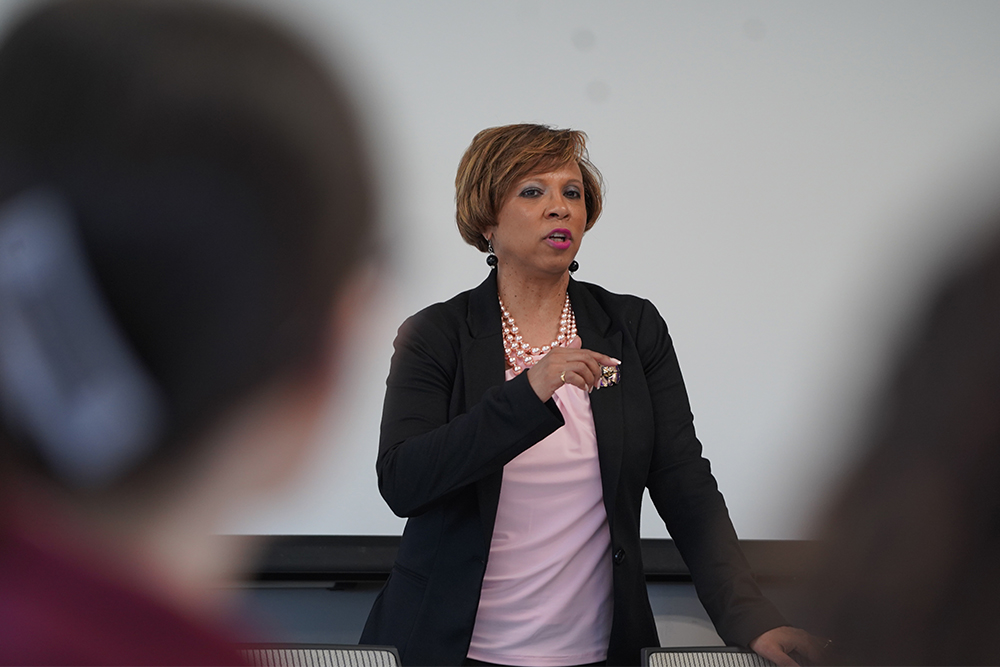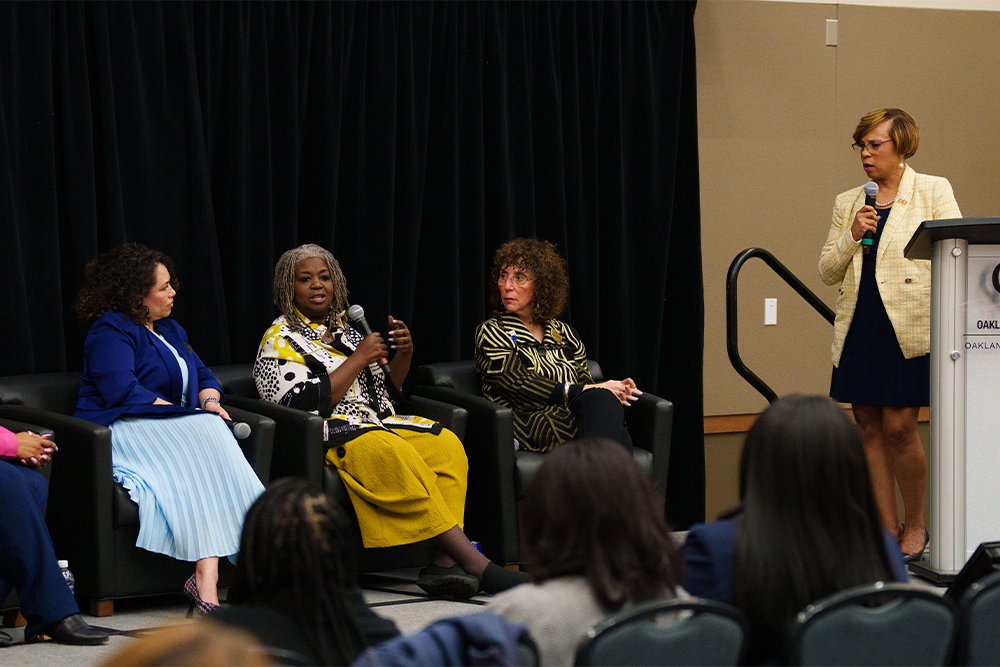
Oakland University William Beaumont School of Medicine held an “amazing week” of engagement, transformational conversations, and more, all aimed at catapulting the community and school to the next level.
The week centered on OUWB’s Culture 365 Initiative — designed to appreciate daily the different traditions, cultures, backgrounds beyond the designated national and international months and days.
The weeklong celebration featured Sophia A. Nelson, Esquire, a renowned DEI thought leader, CNN commentator, and award-winning author. She was in residence engaging the entire community in meaningful dialogues, lectures, panel discussions, and town halls/critical conversations.
It started with the 2024 Varner Vitality Lecture on Monday and wrapped with an engaging lunch-and-learn called “Unification Day of Student Leadership” on Friday. In between, there were planned events, including a town hall and panel discussion featuring Oakland University President Ora Hirsch Pescovitz, M.D.
Christopher Carpenter, M.D., Stephan Sharf interim dean, said he supported the weeklong focus on DEI for many reasons, and took a lot away from being involved in events throughout.
“The impact of diversity, equity, and inclusion, especially in health care, is often misunderstood,” he said. “In health care specifically, the lack of diversity in the physician workforce negatively impacts health outcomes. DEI programs in medical schools have been targeted by recently proposed legislation, without recognition of how the programs can help improve health equity in our communities.”
Tonya Bailey, Ph.D., associate dean, Diversity, Equity, & Inclusion, and Community Engagement, called it an “amazing week.”
“There were needed levels of engagement, efforts, and events that brought key world issues around diversity, equity, and inclusion to the forefront,” she said. “Particularly, related to health care and the Oakland University William Beaumont School of Medicine.”
Bailey said Nelson’s “expertise, leadership, and jewels of knowledge have been openly welcomed, and will lead us to some great actional items where we will take the necessary steps to be our best selves.”
Nelson said she was grateful for the whole week that she, too, called “amazing.”
“That the (Oakland University William Beaumont School of Medicine” had the foresight through (Bailey) and (Carpenter) is great,” she said.
“I hope that people take away that we’re more alike than different, that our most basic thread is our humanity, that they remember E Pluribus Unum – out of many are one —, that we are a work in progress, and that this country has seen darker days,” she added.
Here is a brief recap of events held throughout the week:
Varner Vitality Lecture
Nelson kicked off Minority Health Month and her five-day residency on the campus of Oakland University at the Varner Vitality Lecture with the topic “Redefining freedom, finding pathways for embracing a new concept of American liberty that promotes genuine inclusion for all.”
Nelson, who gave the first Varner Vitality Lecture since 2019, was the first African American speaker in the lectureship that was created in honor of Oakland University’s first chancellor Durward “Woody” Varner. The lecture inspires, supports, and honors the highest academic and scholarly aspiration of OU’s campus community.
Nelson praised the peaceful atmosphere on OU’s campus while referring to many college campuses as having become “battlegrounds of anger and violent protests versus a place for civil debate, passionate disagreement and respectful dissent.”
Nelson, who has served as an adjunct college professor and scholar of philosophy and religion, said she believes that “colleges and educators must lead the way to truly change the country and protect our freedoms.” She suggested colleges offer mandatory courses in emotional intelligence training and conflict resolution.
“We haven’t taught (students)… about managing feelings and emotions,” said Nelson.
“For a new generation of Americans, the students that we teach, they see social and restorative justice as a demand that must be urgently met. They see questioning authority, pushing back, and canceling or doling out consequences to those with whom they disagree.”
She urged academics to honor the doctrine of neutrality, but not to ignore things that are inhumane and immoral.
“We must be neutral arbiters on campus. We must resist the temptation to rebuke colleagues, faculty, or students because we do not share their political point of view, or we dislike a social media post,” said Nelson.
Her lecture also encouraged the audience to educate, talk, and give people a break. More than once, she reminded everyone to be respectful of each other’s differences, and ask questions, explaining that simply inviting someone to talk while enjoying a cup of coffee together can lead to a better understanding of each other’s differences.
“As academics, I think we try to be well meaning people. We don’t like racism. We don’t like sexism; we don’t like anti-LGBTQIA plus,” she said. “We have to come together and figure out how we move academia and the country forward, and how we do it together.”
Medical Student Town Hall
M1 Shreya Desai asks a question during the medical student town hall. |
Tuesday began with Nelson leading “Finding Unity in Plurality – Conversations with the College of Arts & Sciences” and ended with the “Employee Resource Group Roundtable Discussion.”
The middle of the day featured the Medical Student Town Hall. Hosted by M2 and OUWB Medical Student Government President Joey Solomon, the event addressed the importance of diverse perspectives in health care.
“In every level of health care…it’s important to have diverse people with diverse backgrounds,” said Nelson.
Topics addressed during the town hall included: how politics impact health equity; what role politics should play in addressing health disparities; conditions needed for a community to thrive and overcome obstacles and barriers; and how medical students can contribute to a culture of health equity.
M1 Shreya Desai attended the event and asked Nelson about her thoughts on addressing DEI in a way that is not targeting people based on the way they look, “but for actual skills that they have.” She gave the example of an elementary school-aged relative who was accepted into a program because of the relative’s race.
“That’s the kind of stuff we need to put on the table, talk about, and figure out,” said Nelson. “(The relative) is a good example of how there’s this knee jerk reaction to go ahead and put this kind in (a program) because she’s Black and checks a box.”
“I don’t think that’s what DEI should be,” she added.
After the event, Desai said she thought it was great that OUWB fosters such discussions.
“Not many schools are open to this kind of dialogue,” she said. "I hope they continue to offer these kinds of opportunities…it’s really nice.”
Preparing Students for Success
Officials and students from OU, OUWB, Pontiac Promise, and Pontiac Schools take time out for a group shot. |
Wednesday morning saw students from the Pontiac School District and Pontiac Promise visiting the Oakland University campus for “Preparing Students for Success in Health Care Careers: Meaningful Discussions about the Path to Success.”
Rose Wedemeyer, Ph.D., director, Education Training, OUWB, began the event by encouraging students to pursue their passions, as well as the importance of students understanding themselves and how they prefer to find success. A panel discussion followed featuring Julie Kruse, Ph.D., RN, professor, School of Nursing; Deidre Hurse, Ph.D., assistant professor, Department of Foundational Medical Studies, OUWB; Caress Dean, Ph.D., associate professor and director, Public Health; and Teresa Chahine, R.N., adjunct instructor, School of Nursing.
Panelists each shared their unique professional journeys to help students understand how to find success and overcome barriers.
Hurse, for example, shared that when she was an undergraduate, she wanted to be a nurse and then a social worker before realizing she “wasn’t making the impact that I wanted to make.” She decided to pursue a Master of Public Administration degree and finally, a Ph.D. in Health and Rehabilitation Sciences. Among other things, she has leadership experience in health center operations and enabling services. She joined OUWB in 2020.
“Be tenacious and keep going,” she told the audience. “Challenges will come before you but when you set a goal for yourself, keep at it, keep moving forward. Even if it’s a small step. That will help you a lot in your educational trajectory and in your life in general.”
Self-care, DEI, and more
Sophia Nelson and Christopher Carpenter talk after Thursday's panel discussion. |
“How Do We Care for Our Health and Wellness in a Changing Diversity, Equity and Inclusion Environment?” was the title of Thursday’s session called a “courageous conversation.”
The purpose was to discuss the complexities of DEI in health care, Black women’s health and mental health in higher education, examining access to health care, and strategies for promoting well-being and resilience.
Panelists were: Pescovitz; Bailey; Vonda Douglas-Nikitin, M.D., Corewell Health Department of Pathology, associate professor, and assistant dean, Diversity & Inclusion, OUWB; Jennifer Edwards-Johnson, D.O., Michigan State University College of Human Medicine, associate professor of Family Medicine, interim associate dean of Community Academic Programs, and community assistant dean, Flint; Mary Lewis, CEO, Gary Burnstein Community Health Clinic in Pontiac; Aura Cazares, Ed.D., assistant dean and director, Diversity, Equity, and Inclusion, Oakland University; Markey Pierre, DBA, vice chancellor of External Affairs and chief of staff, Louisiana State University Health; Kenya Ayers-Palmore, Ed.D., member, American Council on Education, and Sabrina Jackson, Ph.D., mental health expert and motivational speaker.
Bailey also read a letter from Leandris Liburd, Ph.D., acting director for CDC’s Office of Health Equity, who had planned to participate, but had a change of plans. Liburd said she is "anxiously awaiting the outcomes of your discussions" and thanked the school for hosting "such a courageous and timely dialogue."
The wide-ranging discussion addressed such topics as pay inequities, the importance of allies and mentorship, health equity and inequity, and how DEI impacts each of their roles.
In the context of why diversity, equity, and inclusion is important, Douglas-Nikitin talked about interviewing potential OUWB students.
“Almost every single time I interview a Black person, they tell me how happy they are to see me and the difference it makes for them just to see my face,” she said. “Those interviews often go long because I talk about what it means to be a Black woman in this space and what they’re going to come up against and the resilience that have to have.”
Britt Rios-Ellis, Ph.D., executive vice president for Academic Affairs and provost, Oakland University, thanked Nelson.
“We’ve been so privileged to have you and take part in these numerous activities here on campus, and to have you moderate the discussion with these amazing women today,” she said. Rios-Ellis also expressed her gratitude to the panelists and event sponsor Corewell Health.
Lunch and Learn
Sophia Nelson speaks during the lunch and learn event. |
The week wrapped up on Friday with a lunch-and-learn led by Nelson, who talked about the value of and impact of student leadership.
Discussion topics included promoting solutions to social issues, exploring strategies for promoting DEI and global education, and how to support each other through a spirit of unity and inclusive excellence.
Attendees included representatives from the OUWB community as well as the representatives from Black sororities and fraternities known as the Divine Nine (OU currently has seven of the Divine Nine).
M2 Deena Sukhon attended several events throughout the week, including the final one on Friday.
“I want to implement everything that Sophia Nelson has been talking about in my future practice and career,” she said. “Everything I learned I’m safekeeping for when I can apply it.”
For more information, contact Andrew Dietderich, marketing writer, OUWB, at [email protected].
To request an interview, visit the OUWB Communications & Marketing webpage.
This work is licensed under a Creative Commons Attribution-NonCommercial 4.0 International License.
